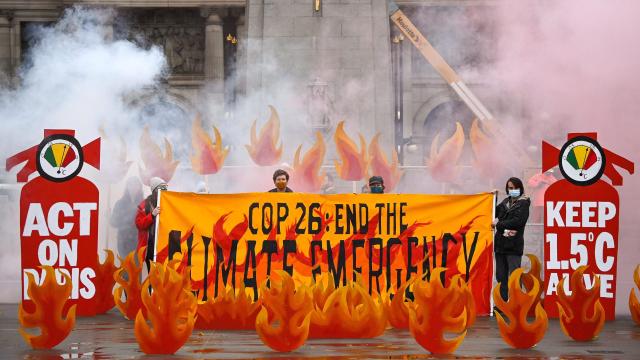Imagine that it’s Thursday evening, and you’re trying to get a big group of friends together to go out to dinner Friday night. These friends are all pretty different. One is vegetarian, while one loves meat; one’s on a budget and would prefer to cook at someone’s house, while another loves to spend big; one is a picky eater, while their opposite loves trying new foods. No one can agree on what to do and, because you’re a fair and just friend group, no one is allowed to make an executive decision, and no voting is allowed — everyone has to organically and unanimously agree on a place to eat.
Time is ticking, and reservations at restaurants are running out, and you’re spending half your time texting people one-on-one who are complaining about all the other people in the group. Your friend group is in danger of imploding over this thing everyone wants to do, but that no one can agree on the details of.
Now sub the idea of “going out to a restaurant” with “keeping the planet from burning.” Welcome to the United Nations climate change talks — otherwise known as COP. But just because your friends suck at picking a place to eat and the world sucks at getting its act together on climate doesn’t mean following through isn’t important. In fact, it’s vital the world make the talks in Glasgow a success and pick the right things off the menu to avert climate catastrophe.
It’s very easy to feel completely depressed about how the conference is going to go. Every day, it seems like we wake up to dire headlines about the Godawful State of Things at UN climate talks. In a press conference last week, UN Secretary General Antonio Guterres said he was “deeply worried but … still hopeful;” a journalist then asked him, point-blank, if he was getting “increasingly desperate” about the chances of success. The question was startling, but frankly not unwarranted.
It’s admittedly hard to get fired up about a UN process that, looking solely at the state of the atmosphere, has not come close to accomplishing its goals. There have been 25 previous international climate talks since the 1990s. During that time, global greenhouse emissions have skyrocketed against a backdrop of increasingly alarming warnings from scientists. It’s also a process that’s incredibly byzantine and filled with buzzwords. (Sorry, what does “loss and damage” mean again?)
Even when that process yields success, it is seemingly incremental. The Paris Agreement, arguably the biggest accomplishment in 25 and counting meetings, is actually pretty toothless. COP26 president Alok Sharma said this week that success in Glasgow would be even “harder” to attain, and compared the state of the negotiations to a student taking a test.
“We still have some of the most difficult questions to answer, and we’re effectively in the last half hour of the exam,” he said.
But even if the process is opaque, the science is very clear: as the IPCC laid out in its latest report, the time to act is essentially now or never. We’re going to see increasingly dire impacts of climate change in every corner of the globe as the world inevitably hits 1.5 degrees Celsius (2.7 degrees Fahrenheit) — but there’s still a chance that we can stave off the worst impacts and start beating back some of that warming.
Fortunately, we know there’s political will there. The Paris Agreement may be largely symbolic, but it is a hugely powerful symbol, and it’s somewhat of a miracle that it ever happened at all. It’s so powerful, in fact, that nearly every single country in the world has ratified it. The agreement has become a buzzword (for better or for worse) for cities, states, and businesses to signify that they’re committed to doing something, anything, about changing their practices to get the world in line with what needs to happen.
What’s more, we’ve got models of what international success could look like. It’s very easy to be down in the dumps and think that international cooperation on any large-scale environmental regulation is impossible, but we’ve actually done it before. In the 1980s, countries around the world came together to agree on what’s known as the Montreal Protocol to phase out then widely-used chemicals that were harming the atmosphere. Some 30 years later, the UN reports that the ozone layer could be totally healed by 2060, thanks to this decisive action. That’s pretty incredible.
Climate change is a bit of a larger and more complex puzzle to unravel than the ozone layer. The issue that’s been poisoned for decades by fossil fuel companies committed to selling their products. But we know what needs to happen to lower emissions, we have much of the technology, and we’ve seen successful agreements before.
It’s perhaps a little bit naive to put stock in the idea that the world can come to an international agreement after all these years in a world that feels more splintered than ever. Ultimately, pessimism is something we simply cannot afford.
Indigenous groups and frontline communities being impacted by climate change are counting on success. Young people who will live their entire lives shaped by the decisions made today are counting on success. They’re planning to turn out in the streets around the world to advocate for this meeting to do more than the 25 past iterations have to address the climate crisis. If they have faith and fight, then world leaders need to as well.
